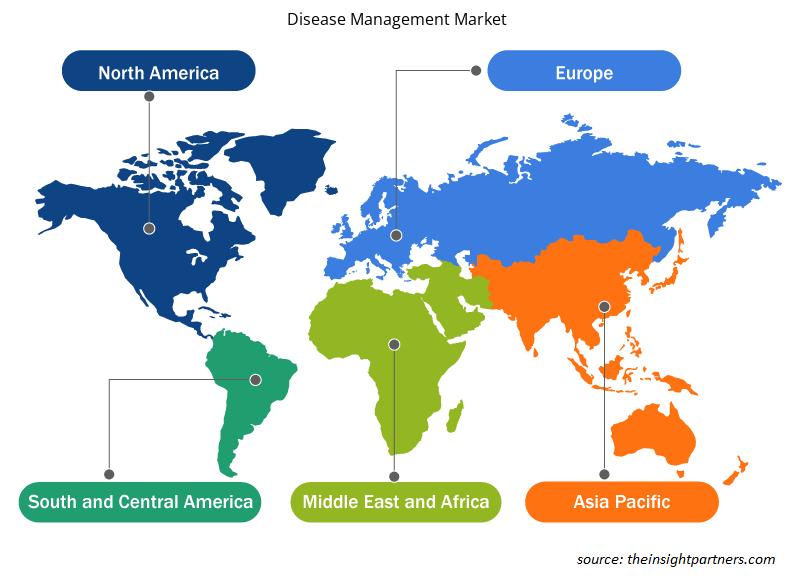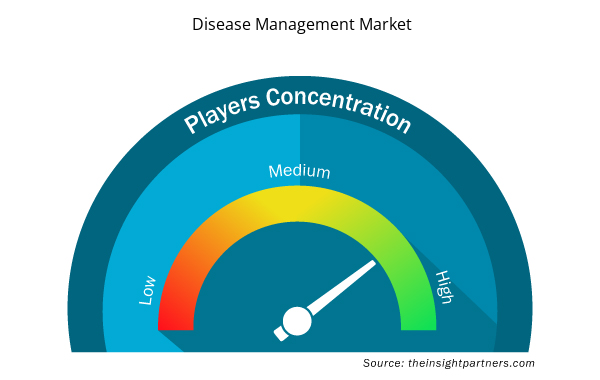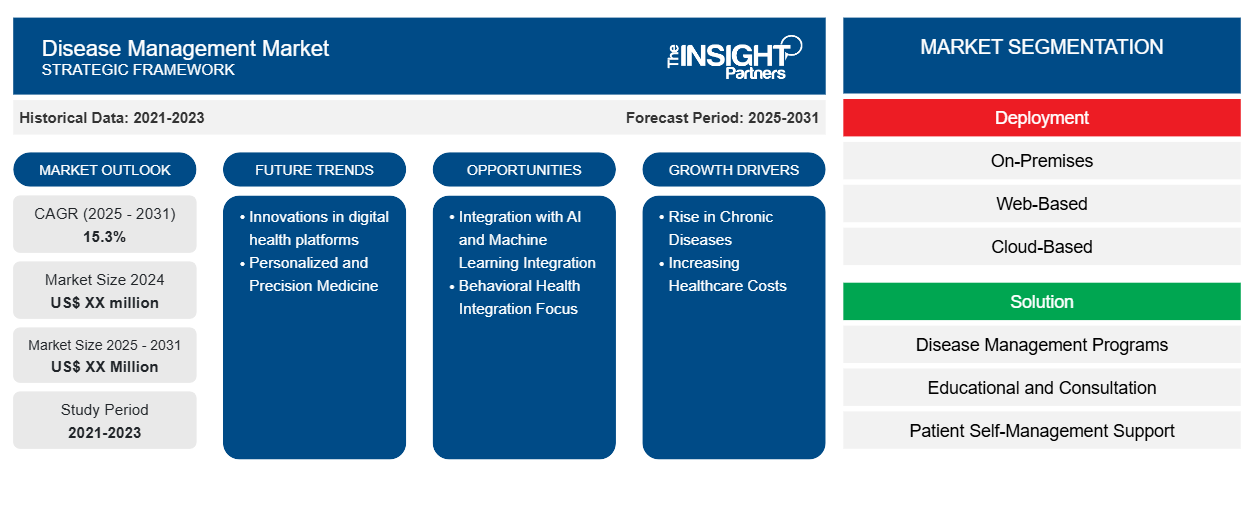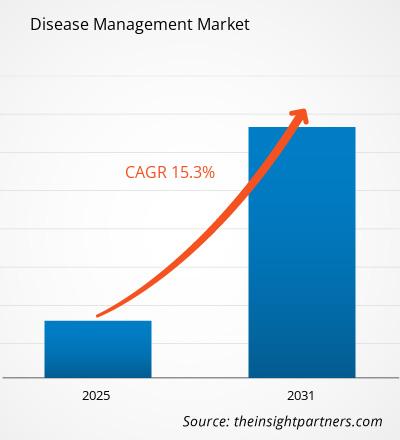Es wird erwartet, dass der Markt für Krankheitsmanagement von 2023 bis 2031 eine durchschnittliche jährliche Wachstumsrate (CAGR) von 15,3 % verzeichnet, wobei die Marktgröße von XX Millionen US-Dollar im Jahr 2023 auf XX Millionen US-Dollar im Jahr 2031 anwachsen wird.
Der Bericht ist segmentiert nach Bereitstellung (vor Ort, webbasiert, cloudbasiert); Lösung (Disease Management Programs (DMPs), Schulung und Beratung, Unterstützung des Selbstmanagements von Patienten, Gesundheitsinformationstechnologien (HITs), Sonstiges); Krankheitsindikation (Herz-Kreislauf-Erkrankungen, Diabetes, Krebs, chronisch obstruktive Lungenerkrankungen (COPD), Sonstiges); Endnutzer (Zahler, Anbieter, Sonstiges). Die globale Analyse ist weiter auf regionaler Ebene und in den wichtigsten Ländern aufgeschlüsselt. Der Bericht bietet den Wert in USD für die oben genannte Analyse und die Segmente.
Zweck des Berichts
Der Bericht „Disease Management Market“ von The Insight Partners soll die aktuelle Situation und das zukünftige Wachstum sowie die wichtigsten treibenden Faktoren, Herausforderungen und Chancen beschreiben. Dies wird verschiedenen Geschäftspartnern Einblicke geben, wie zum Beispiel:
- Technologieanbieter/-hersteller: Um die sich entwickelnde Marktdynamik zu verstehen und die potenziellen Wachstumschancen zu kennen, damit sie fundierte strategische Entscheidungen treffen können.
- Investoren: Durchführung einer umfassenden Trendanalyse hinsichtlich der Marktwachstumsrate, der finanziellen Marktprognosen und der Chancen entlang der Wertschöpfungskette.
- Regulierungsbehörden: Zur Regulierung von Richtlinien und Überwachungsaktivitäten auf dem Markt mit dem Ziel, Missbrauch zu minimieren, das Vertrauen der Anleger zu bewahren und die Integrität und Stabilität des Marktes aufrechtzuerhalten.
Marktsegmentierung für Krankheitsmanagement
Einsatz
- Vor Ort
- Webbasiert
- Cloudbasiert
Lösung
- Krankheitsmanagementprogramme
- Bildung und Beratung
- Unterstützung des Patientenselbstmanagements
- Gesundheitsinformationstechnologien
Krankheiten Indikation
- Herz-Kreislauf-Erkrankungen
- Diabetes
- Krebs
- Chronisch obstruktive Lungenerkrankungen
Endbenutzer
- Zahler
- Anbieter
- Sonstiges
Endbenutzer
- Zahler
- Anbieter
- Sonstiges
Passen Sie diesen Bericht Ihren Anforderungen an
Sie erhalten kostenlose Anpassungen an jedem Bericht, einschließlich Teilen dieses Berichts oder einer Analyse auf Länderebene, eines Excel-Datenpakets sowie tolle Angebote und Rabatte für Start-ups und Universitäten.
- Holen Sie sich die wichtigsten Markttrends aus diesem Bericht.Dieses KOSTENLOSE Beispiel umfasst eine Datenanalyse von Markttrends bis hin zu Schätzungen und Prognosen.
Wachstumstreiber im Markt für Krankheitsmanagement
- Zunahme chronischer Krankheiten: Einer der Haupttreiber des Marktes für Krankheitsmanagement ist die weltweit zunehmende Verbreitung chronischer Krankheiten. Krankheiten wie Diabetes, Bluthochdruck, Herz-Kreislauf-Erkrankungen und Atemwegserkrankungen nehmen aufgrund von Faktoren wie der alternden Bevölkerung, ungesunder Lebensführung und Umweltfaktoren zu. Die steigende Zahl chronisch Kranker hat zu einer größeren Nachfrage nach Krankheitsmanagementlösungen geführt, die die Patientenversorgung verbessern, Krankenhausaufenthalte reduzieren und langfristige Erkrankungen wirksam behandeln können.
- Steigende Gesundheitskosten: Steigende Gesundheitskosten sind ein großes Problem für Regierungen und Gesundheitsdienstleister weltweit. Insbesondere chronische Krankheiten stellen aufgrund des langfristigen Behandlungsbedarfs, häufiger Krankenhausaufenthalte und Notfallversorgung eine erhebliche finanzielle Belastung für die Gesundheitssysteme dar. Krankheitsmanagementprogramme, die auf vorbeugende Behandlung, frühzeitiges Eingreifen und langfristiges Management chronischer Krankheiten abzielen, werden zunehmend als Lösung zur Senkung der Gesundheitskosten angesehen. Diese Programme tragen dazu bei, Krankenhausbesuche zu minimieren, die Einhaltung von Behandlungsplänen durch die Patienten zu verbessern und die gesamten Gesundheitsausgaben zu senken.
Zukünftige Trends im Markt für Krankheitsmanagement
- Innovationen bei digitalen Gesundheitsplattformen: Digitale Gesundheitsplattformen werden zusammen mit neuen Analysemöglichkeiten, Echtzeitüberwachung und benutzerfreundlicheren Schnittstellen immer beliebter. Die Plattformen werden wahrscheinlich eine bessere Kommunikation zwischen Patienten und Gesundheitsdienstleistern fördern. Die Modelle des Krankheitsmanagements wären patientenzentriert und würden die Präferenzen und Anforderungen des Patienten berücksichtigen.
- Personalisierte und Präzisionsmedizin: Da sich die Medizin weiterentwickelt, wird die personalisierte und Präzisionsmedizin zu einem wichtigen Trend im Krankheitsmanagement. Dank der Fortschritte in der Genomik und der Identifizierung von Biomarkern können Gesundheitsdienstleister nun Behandlungspläne auf einzelne Patienten zuschneiden, die auf deren genetische Veranlagung, Lebensstil und spezifische Krankheitsmerkmale abgestimmt sind. Dieser Trend dürfte die Wirksamkeit von Krankheitsmanagementprogrammen verbessern, indem er gezielt auf die für jeden Patienten am besten geeigneten Behandlungen abzielt, die Ergebnisse verbessert und die Nebenwirkungen minimiert.
Marktchancen für Krankheitsmanagement
- Integration mit KI und maschinellem Lernen: Ein Vorteil der Verwendung künstlicher Intelligenz und maschinellen Lernens ist die Verbesserung der Risikostratifizierung, prädiktiver Analysen und einer stärkeren Anpassung der Behandlungsplanung. Es identifiziert gefährdete Bevölkerungsgruppen und nimmt die erforderlichen Anpassungen der Interventionen entsprechend ihren Bedürfnissen auf effiziente Weise vor.
- Schwerpunkt Integration der Verhaltensgesundheit: Die Integration von psychiatrischen Diensten in die Behandlung chronischer Krankheiten ist ein umfassendes Pflegemodell, das sowohl die physische als auch die psychische Gesundheit fördert. Die Einbeziehung psychiatrischer Dienste in die Behandlung chronischer Krankheiten verbessert die allgemeinen Gesundheitsergebnisse für Patienten mit chronischen Krankheiten.
Regionale Einblicke in den Markt für Krankheitsmanagement
Die regionalen Trends und Faktoren, die den Markt für Krankheitsmanagement im Prognosezeitraum beeinflussen, wurden von den Analysten von Insight Partners ausführlich erläutert. In diesem Abschnitt werden auch die Marktsegmente und die Geografie des Marktes für Krankheitsmanagement in Nordamerika, Europa, im asiatisch-pazifischen Raum, im Nahen Osten und Afrika sowie in Süd- und Mittelamerika erörtert.

- Erhalten Sie regionale Daten zum Markt für Krankheitsmanagement
Umfang des Marktberichts zum Krankheitsmanagement
| Berichtsattribut | Details |
|---|---|
| Marktgröße im Jahr 2023 | XX Millionen US-Dollar |
| Marktgröße bis 2031 | XX Millionen US-Dollar |
| Globale CAGR (2023 - 2031) | 15,3 % |
| Historische Daten | 2021-2022 |
| Prognosezeitraum | 2024–2031 |
| Abgedeckte Segmente | Nach Bereitstellung
|
| Abgedeckte Regionen und Länder | Nordamerika
|
| Marktführer und wichtige Unternehmensprofile |
|
Dichte der Marktteilnehmer im Bereich Krankheitsmanagement: Die Auswirkungen auf die Geschäftsdynamik verstehen
Der Markt für Krankheitsmanagement wächst rasant, angetrieben durch die steigende Endverbrauchernachfrage aufgrund von Faktoren wie sich entwickelnden Verbraucherpräferenzen, technologischen Fortschritten und einem größeren Bewusstsein für die Vorteile des Produkts. Mit steigender Nachfrage erweitern Unternehmen ihr Angebot, entwickeln Innovationen, um die Bedürfnisse der Verbraucher zu erfüllen, und nutzen neue Trends, was das Marktwachstum weiter ankurbelt.
Die Marktteilnehmerdichte bezieht sich auf die Verteilung der Firmen oder Unternehmen, die in einem bestimmten Markt oder einer bestimmten Branche tätig sind. Sie gibt an, wie viele Wettbewerber (Marktteilnehmer) in einem bestimmten Marktraum im Verhältnis zu seiner Größe oder seinem gesamten Marktwert präsent sind.
Die wichtigsten auf dem Markt für Krankheitsmanagement tätigen Unternehmen sind:
- Avicenna Medical Systems
- ScienceSoft USA Corporation
- Avedon Gesundheitssysteme
- Orthus Gesundheit
- West Corporation
Haftungsausschluss : Die oben aufgeführten Unternehmen sind nicht in einer bestimmten Reihenfolge aufgeführt.

- Überblick über die wichtigsten Akteure auf dem Markt für Krankheitsmanagement
Wichtige Verkaufsargumente
- Umfassende Abdeckung: Der Bericht deckt die Analyse von Produkten, Dienstleistungen, Typen und Endbenutzern des Krankheitsmanagement-Marktes umfassend ab und bietet einen ganzheitlichen Überblick.
- Expertenanalyse: Der Bericht basiert auf dem umfassenden Verständnis von Branchenexperten und Analysten.
- Aktuelle Informationen: Der Bericht stellt durch die Abdeckung aktueller Informationen und Datentrends Geschäftsrelevanz sicher.
- Anpassungsoptionen: Dieser Bericht kann angepasst werden, um spezifische Kundenanforderungen zu erfüllen und die Geschäftsstrategien optimal anzupassen.
Der Forschungsbericht zum Markt für Krankheitsmanagement kann daher dabei helfen, die Branchensituation und Wachstumsaussichten zu entschlüsseln und zu verstehen. Obwohl es einige berechtigte Bedenken geben kann, überwiegen die allgemeinen Vorteile dieses Berichts tendenziell die Nachteile.
- Historische Analyse (2 Jahre), Basisjahr, Prognose (7 Jahre) mit CAGR
- PEST- und SWOT-Analyse
- Marktgröße Wert/Volumen – Global, Regional, Land
- Branche und Wettbewerbsumfeld
- Excel-Datensatz


- Non-Emergency Medical Transportation Market
- Educational Furniture Market
- Unit Heater Market
- Health Economics and Outcome Research (HEOR) Services Market
- Redistribution Layer Material Market
- Machine Condition Monitoring Market
- Transdermal Drug Delivery System Market
- Mesotherapy Market
- Ceiling Fans Market
- Constipation Treatment Market

Report Coverage
Revenue forecast, Company Analysis, Industry landscape, Growth factors, and Trends

Segment Covered
This text is related
to segments covered.

Regional Scope
North America, Europe, Asia Pacific, Middle East & Africa, South & Central America

Country Scope
This text is related
to country scope.
Häufig gestellte Fragen
Some of the customization options available based on the request are an additional 3-5 company profiles and country-specific analysis of 3-5 countries of your choice. Customizations are to be requested/discussed before making final order confirmation# as our team would review the same and check the feasibility
The report can be delivered in PDF/PPT format; we can also share excel dataset based on the request
Innovations in digital health platforms are likely to remain a key trend in the market.
Chronic disease and increasing healthcare costs are the major factors driving the disease management market.
The Disease Management Market is estimated to witness a CAGR of 15.3% from 2023 to 2031
Trends and growth analysis reports related to Technology, Media and Telecommunications : READ MORE..
The List of Companies
1. Avicenna Medical Systems
2. ScienceSoft USA Corporation
3. Avedon Health Systems
4. Orthus Health
5. West Corporation
6. Provata Health
7. U.S. Preventive Medicine
8. i2i Population Health
9. Pegasystems Inc.
10. ThoroughCare, Inc.
The Insight Partners performs research in 4 major stages: Data Collection & Secondary Research, Primary Research, Data Analysis and Data Triangulation & Final Review.
- Data Collection and Secondary Research:
As a market research and consulting firm operating from a decade, we have published and advised several client across the globe. First step for any study will start with an assessment of currently available data and insights from existing reports. Further, historical and current market information is collected from Investor Presentations, Annual Reports, SEC Filings, etc., and other information related to company’s performance and market positioning are gathered from Paid Databases (Factiva, Hoovers, and Reuters) and various other publications available in public domain.
Several associations trade associates, technical forums, institutes, societies and organization are accessed to gain technical as well as market related insights through their publications such as research papers, blogs and press releases related to the studies are referred to get cues about the market. Further, white papers, journals, magazines, and other news articles published in last 3 years are scrutinized and analyzed to understand the current market trends.
- Primary Research:
The primarily interview analysis comprise of data obtained from industry participants interview and answers to survey questions gathered by in-house primary team.
For primary research, interviews are conducted with industry experts/CEOs/Marketing Managers/VPs/Subject Matter Experts from both demand and supply side to get a 360-degree view of the market. The primary team conducts several interviews based on the complexity of the markets to understand the various market trends and dynamics which makes research more credible and precise.
A typical research interview fulfils the following functions:
- Provides first-hand information on the market size, market trends, growth trends, competitive landscape, and outlook
- Validates and strengthens in-house secondary research findings
- Develops the analysis team’s expertise and market understanding
Primary research involves email interactions and telephone interviews for each market, category, segment, and sub-segment across geographies. The participants who typically take part in such a process include, but are not limited to:
- Industry participants: VPs, business development managers, market intelligence managers and national sales managers
- Outside experts: Valuation experts, research analysts and key opinion leaders specializing in the electronics and semiconductor industry.
Below is the breakup of our primary respondents by company, designation, and region:

Once we receive the confirmation from primary research sources or primary respondents, we finalize the base year market estimation and forecast the data as per the macroeconomic and microeconomic factors assessed during data collection.
- Data Analysis:
Once data is validated through both secondary as well as primary respondents, we finalize the market estimations by hypothesis formulation and factor analysis at regional and country level.
- Macro-Economic Factor Analysis:
We analyse macroeconomic indicators such the gross domestic product (GDP), increase in the demand for goods and services across industries, technological advancement, regional economic growth, governmental policies, the influence of COVID-19, PEST analysis, and other aspects. This analysis aids in setting benchmarks for various nations/regions and approximating market splits. Additionally, the general trend of the aforementioned components aid in determining the market's development possibilities.
- Country Level Data:
Various factors that are especially aligned to the country are taken into account to determine the market size for a certain area and country, including the presence of vendors, such as headquarters and offices, the country's GDP, demand patterns, and industry growth. To comprehend the market dynamics for the nation, a number of growth variables, inhibitors, application areas, and current market trends are researched. The aforementioned elements aid in determining the country's overall market's growth potential.
- Company Profile:
The “Table of Contents” is formulated by listing and analyzing more than 25 - 30 companies operating in the market ecosystem across geographies. However, we profile only 10 companies as a standard practice in our syndicate reports. These 10 companies comprise leading, emerging, and regional players. Nonetheless, our analysis is not restricted to the 10 listed companies, we also analyze other companies present in the market to develop a holistic view and understand the prevailing trends. The “Company Profiles” section in the report covers key facts, business description, products & services, financial information, SWOT analysis, and key developments. The financial information presented is extracted from the annual reports and official documents of the publicly listed companies. Upon collecting the information for the sections of respective companies, we verify them via various primary sources and then compile the data in respective company profiles. The company level information helps us in deriving the base number as well as in forecasting the market size.
- Developing Base Number:
Aggregation of sales statistics (2020-2022) and macro-economic factor, and other secondary and primary research insights are utilized to arrive at base number and related market shares for 2022. The data gaps are identified in this step and relevant market data is analyzed, collected from paid primary interviews or databases. On finalizing the base year market size, forecasts are developed on the basis of macro-economic, industry and market growth factors and company level analysis.
- Data Triangulation and Final Review:
The market findings and base year market size calculations are validated from supply as well as demand side. Demand side validations are based on macro-economic factor analysis and benchmarks for respective regions and countries. In case of supply side validations, revenues of major companies are estimated (in case not available) based on industry benchmark, approximate number of employees, product portfolio, and primary interviews revenues are gathered. Further revenue from target product/service segment is assessed to avoid overshooting of market statistics. In case of heavy deviations between supply and demand side values, all thes steps are repeated to achieve synchronization.
We follow an iterative model, wherein we share our research findings with Subject Matter Experts (SME’s) and Key Opinion Leaders (KOLs) until consensus view of the market is not formulated – this model negates any drastic deviation in the opinions of experts. Only validated and universally acceptable research findings are quoted in our reports.
We have important check points that we use to validate our research findings – which we call – data triangulation, where we validate the information, we generate from secondary sources with primary interviews and then we re-validate with our internal data bases and Subject matter experts. This comprehensive model enables us to deliver high quality, reliable data in shortest possible time.


 Holen Sie sich ein kostenloses Muster für diesen Bericht
Holen Sie sich ein kostenloses Muster für diesen Bericht